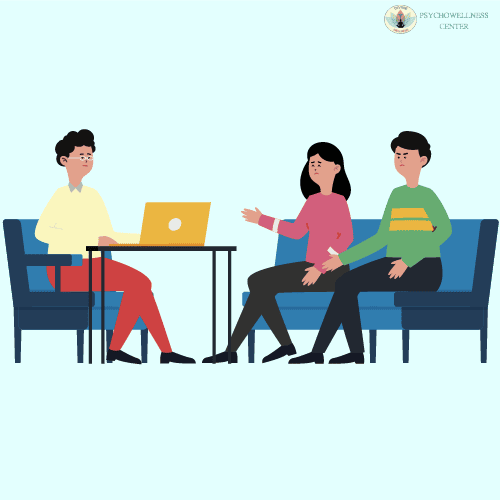What Does a Child Psychologist Do?

A child psychologist
is a mental health practitioner who teaches kids and teenagers how to deal with
mental health problems and life's challenges through psychological exams and
various forms of therapy. They can aid in the treatment of illnesses related to
the mind, heart, society, and behavior.
An infant, toddler, child, or adolescent's mental, emotional, social, and
behavioral health can be evaluated and treated by a child psychologist due to
their professional training and clinical skills.
Child psychologists are well-versed in the fundamental psychological requirements of kids and teens as well as how their social, familial, and other environments influence their:
- Emotional and social
adjustment.
- Morphological
procedures.
- Behavior modification.
Expert knowledge of the
mental and behavioral issues that affect children is another specialty of child
psychologists.
When working with kids and teenagers, child psychologists employ a variety of techniques and abilities, such as:
- Testing and assessment to evaluate psychological, intellectual, cognitive, and behavioral disorders.
- Using therapies like
behavior control and talk therapy (psychotherapy).
- Creating programs for
prevention, such as those against teen pregnancy, addiction, and bullying.
- Obtaining advice from
other specialists and medical personnel who treat children.
Children with medical
issues frequently receive thorough care from child psychologists. Children who
struggle with sleep, or chronic pain, or those managing a chronic illness, for
instance, may benefit from their assistance.
Due to differences in
age, cognitive ability, and maturity, children's emotional, mental, and
behavioral disorders are frequently treated differently from those that affect
adults. Due to this, child psychologists can employ a variety of therapy
strategies depending on your child's age and particular circumstances. Child
psychologists may only work with you (or guardians) depending on your child's
age and needs in order to assist with parenting techniques or the best way to
handle your child's behavior
These therapies
include:
- Art therapy.
- Behavioral therapy.
- Child-centered play
therapy.
- Child-parent
relationship therapy.
- Child anger management
therapy.
- Child trauma therapy.
- Cognitive behavioral
therapy (CBT).
- Dialectical behavioral
therapy (DBT).
- Emotionally focused
therapy.
- Group or family
therapy.
- Music therapy.
- Occupational therapy.
- Parent-child
interaction therapy.
A master's degree in a
discipline associated with mental health, such as psychology, counseling
psychology, or marriage and family therapy, is required of a child therapist. A
child therapist is qualified to assess the emotional and behavioral well-being
of kids and apply therapeutic strategies like talk therapy. The method utilized
by therapists is typically more problem-solving oriented.
A child psychologist
holds a doctorate (Ph.D.) and frequently has considerable training in clinical
psychology or psychological research. To help with the diagnosis of mental
health and learning challenges, such as ADHD, autism spectrum disorder, and learning disabilities, child
psychologists can do several tests that therapists cannot.
While there are many
aspects of child therapists' and child psychologists' work that overlap, there
are some key distinctions between what each can do for you and your child.
Your child can benefit
from therapy by learning how to deal with challenging situations, develop
coping mechanisms to deal with strong emotions, and improve family relationships.
A therapist may not be
the ideal choice if you need a diagnosis for an IEP (individualized education
plan) or other school adjustments, even though they can assist in treating your
child's emotional or mental health problems. Schools frequently favor having
you consult a psychologist for this.
You should consider taking your child to a therapist if:
- They require emotional assistance and a confidant with whom to discuss their feelings.
- They are coping with
significant life changes, despair, anxiety, or anger.
- You need assistance in
figuring out how to get along with your child more effectively and modify
challenging behavior.
- You don't need assistance with medicine or more complicated mental health issues; you just want your child to see someone on a regular basis.
When you need more
information regarding the cause of your kid's troubles or if your child has an
IEP, a child psychologist can do several tests that therapists are unable to.
Visiting a psychologist with your kid is something you should think about if:
- You suspect your child
may suffer from a condition like ADHD, a learning disability, or an autism spectrum disorder that interferes with their
ability to learn or interact with others.
- Help managing emotional
or behavioral issues is required for your child.
- You want your child's
diagnosis to be more thorough.
- Finding out what adjustments you can make at home and what adjustments the school can do to better support your child is one of your therapy goals.
Child psychologists and
therapists are unable to write prescriptions for drugs. A child psychiatrist, a
medical professional who specializes in the field of psychiatry, may be needed
if your child needs medication to treat a more severe mental health condition.
Therapy is a priceless
tool that offers a secure environment for both adults and children to discuss and deal with the difficulties life
throws at us, whether they are temporary circumstances or mental health
disorders.
Nobody knows your child
as you do. Your child may benefit from seeing a child psychologist if you
believe they are having difficulties in school, relationships, managing emotions, behavior, and/or learning.
You can evaluate if and when your child would benefit from seeing a child psychologist by keeping an eye out for the following broad circumstances and behaviors:
- A significant change or
stressful circumstance is affecting your children, such as bullying, a medical
condition, a divorce, or a move to a new city or school.
- The behavioral,
emotional, and/or mental issues your child is having seem to be becoming worse
over time rather than better.
- Traumatic events like a
death, an accident, or abuse have affected your child or your family.
- Your youngster has
undergone significant behavioral or personality changes.
- It's difficult for your
child to make and keep friends.
- Your child's behavior at school is problematic or their grades are declining.
If you want to ensure that your child's development encompassing, physical, social, emotional, and psychological development is in the right direction seek consultation with the best psychologists who will help you understand the emotional needs of the child, enable you to understand your needs and limitations better, and holistic development. You can also meet in the clinic with the best clinical psychologists & parenting coaches at Psychowellness Center, a multi-location clinic at Janakpuri, Dwarka, VasantVihar, Gurgaon, NOIDA, Faridabad, and Delhi NCR.
#psychologistdwarka,
#lifecoach, #psychologistdelhi, #psychologistdwarka, #ABAtherapy,
#AutismTherapy, #personalitydevelopment
Contributed
by:- Dr (Prof) R K Suri Clinical
Psychologist & Ms.
Aditi
Bhardwaj




SHARE